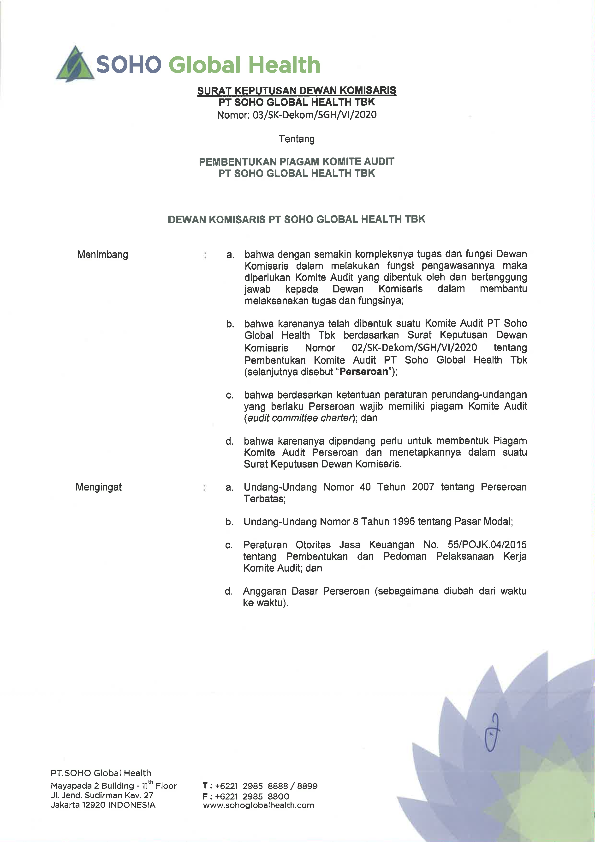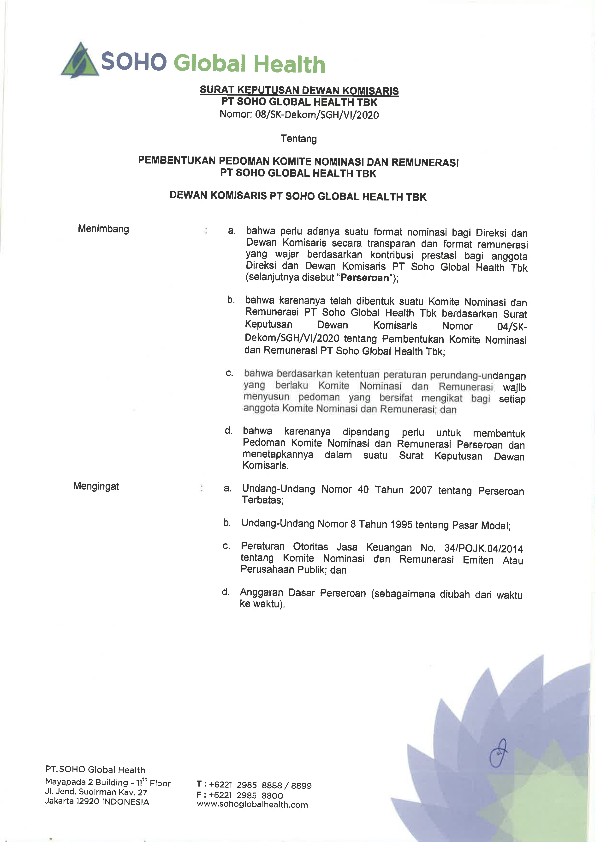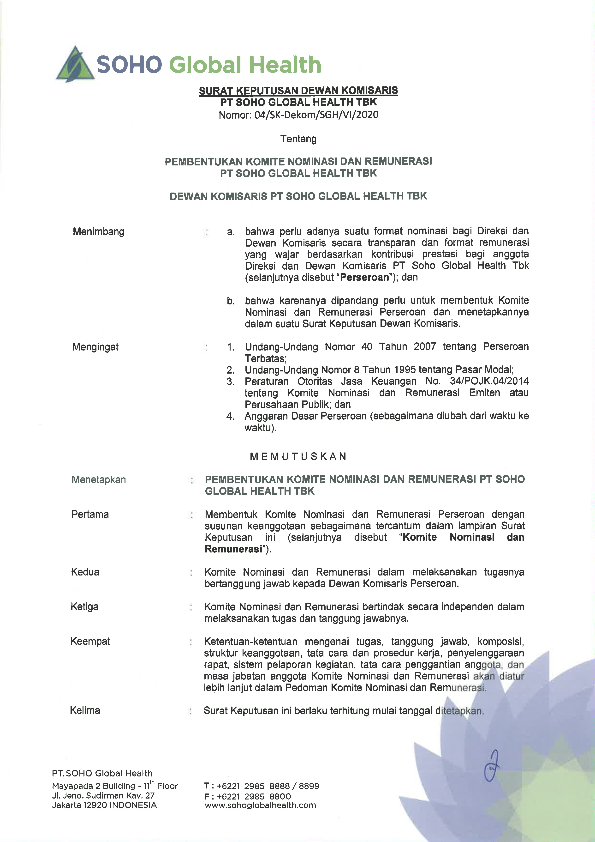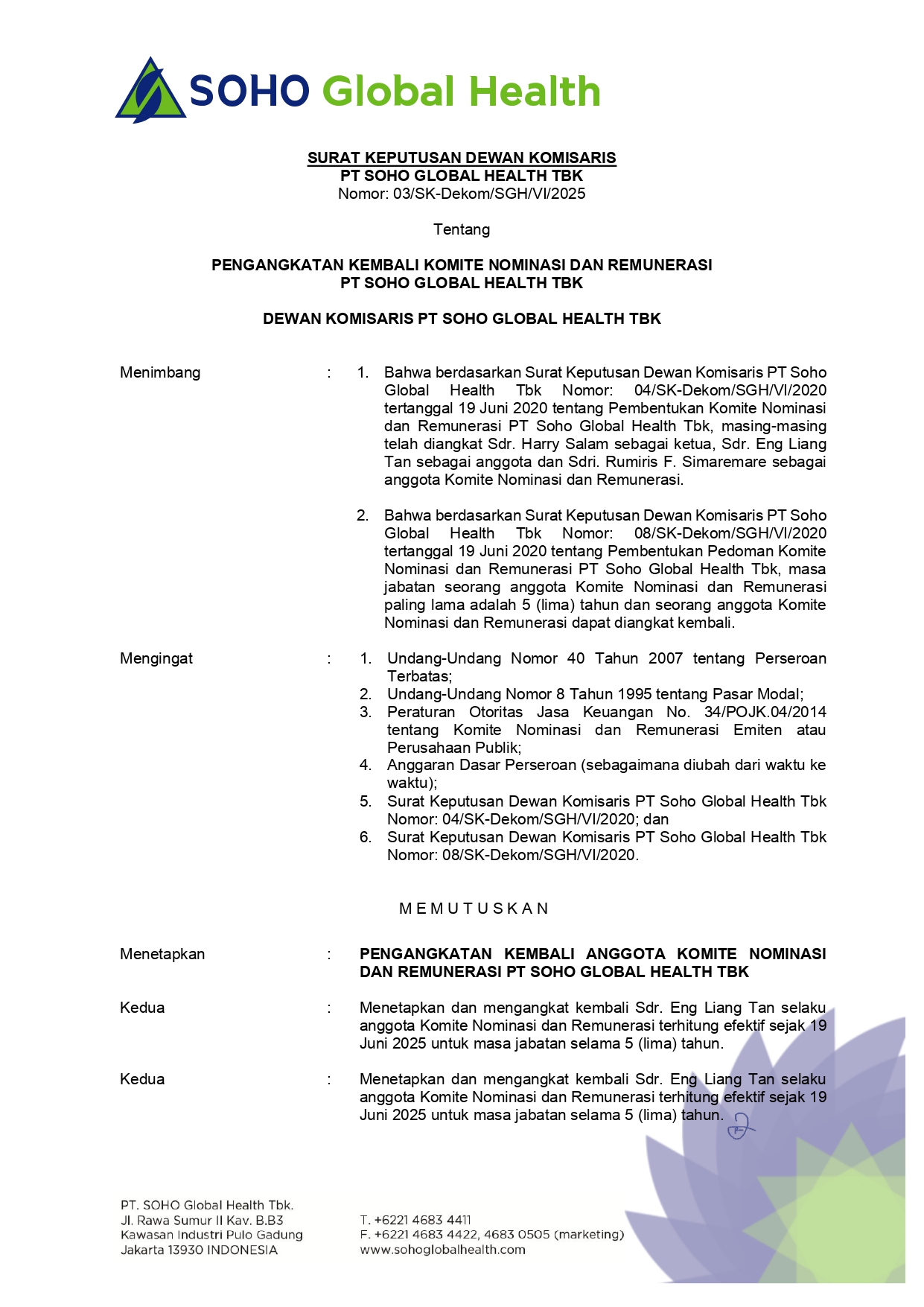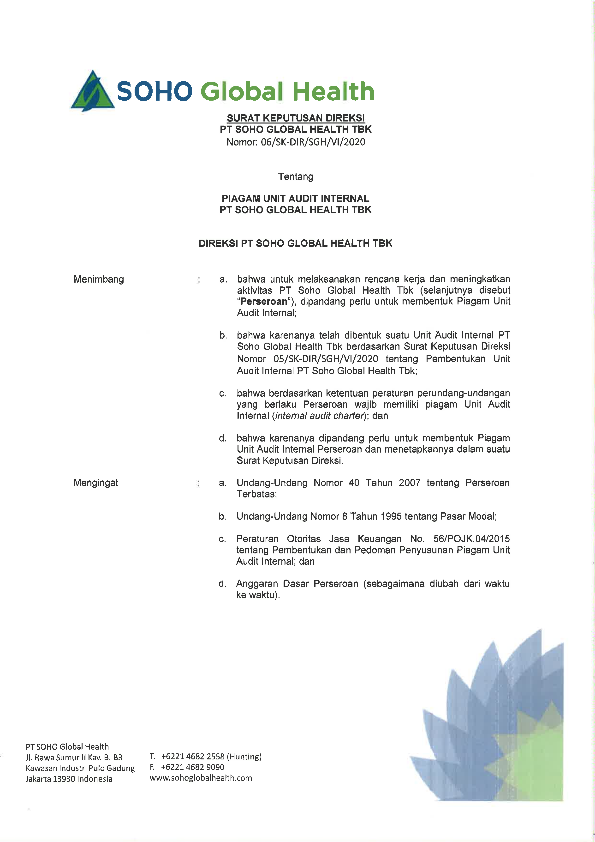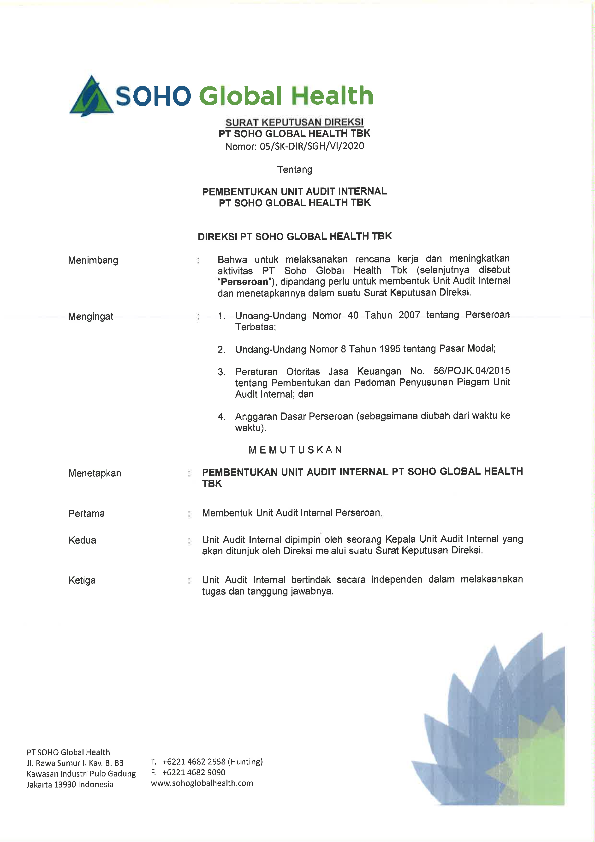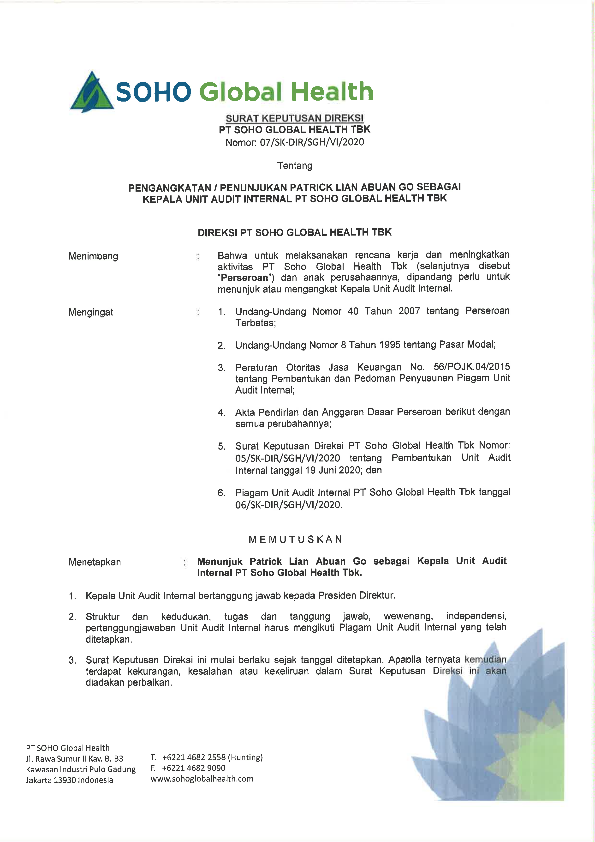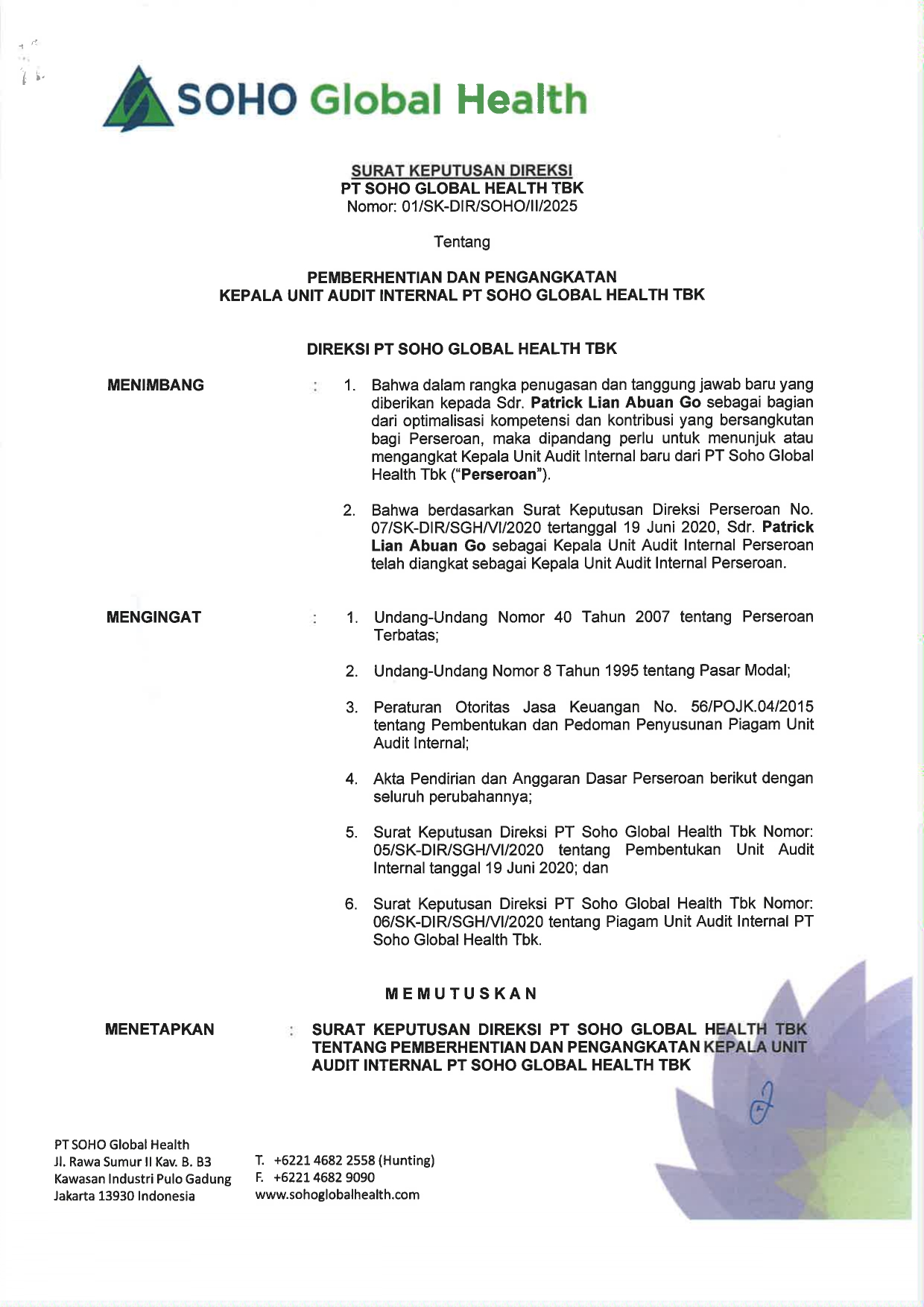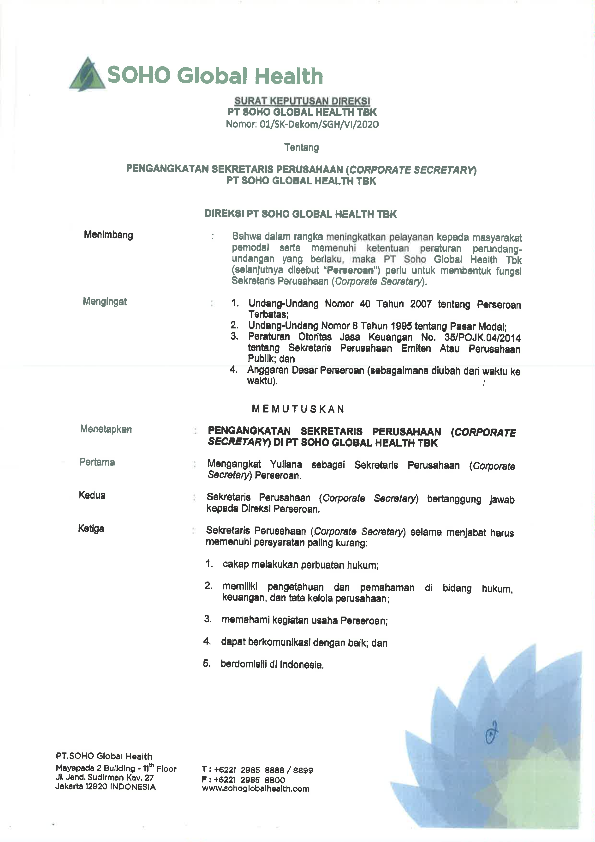Good Corporate Governance
The Company is committed to operate at the highest standards of Good Corporate Governance. We want to ensure that everything our employees do is guided by our commitment to our values and is in compliance with the local laws and regulations. The foundations of these commitments are laid out in our Good Corporate Governance (“GCG”) Code, which we established in October 2015 and has become the underpinning set of rules for management and employees. The GCG Code collects a number of key principles and provides a working guideline for the way in which we apply our values across our operations. GCG practices are extremely important to the Company’s ability to accomplish its goals.
The GCG implementation has been carried out in accordance with the applicable laws and Company regulations. Each business functions independently and responsibly. Every decision taken has considered the GCG principles related to transparency, accountability, responsibility, independence, as well as equality and fairness. These five principles of GCG help the Company to maintain a harmonious and ethical relationship with its shareholders and other stakeholders.
In addition, the implementation of GCG principles in business activities is also supporting integrity, work ethics, and accountable decision-making through supervision, control activities and adequate risk management.
Based on this understanding, GCG becomes the reference for the Company to deal with the increasing competition and the uncertainties in business, while ensuring its long-term business continuity.
To enhance the implementation quality, the Company conducts evaluation and follow up for the implementation of GCG across its entire portfolio of businesses.
General Meeting Shareholders
The General Meeting Shareholder (“GMS”) is the main mechanism to protect and exercise the rights of shareholders. As an organ of the Company, GMS holds the highest mandate within the Company and possesses all authorities which cannot be delegated to the Board of Commissioners and Board of Directors. The GMS holds the highest mandate in the Company that facilitates shareholders to make important decisions regarding their investment in the Company. However, without diluting either the power or authority of the GMS, the GMS or shareholders may not intervene against the duties, functions, and authorities of the Board of Commissioners and Board of Directors, in carrying out their obligations and rights in accordance with the Articles of Association and prevailing laws and regulations. The GMS serves as a mechanism for shareholders to make important decisions regarding their investment in the Company, by observing provisions in the Articles of Association and all prevailing regulations.
Kebijakan Perusahaan Lainnya
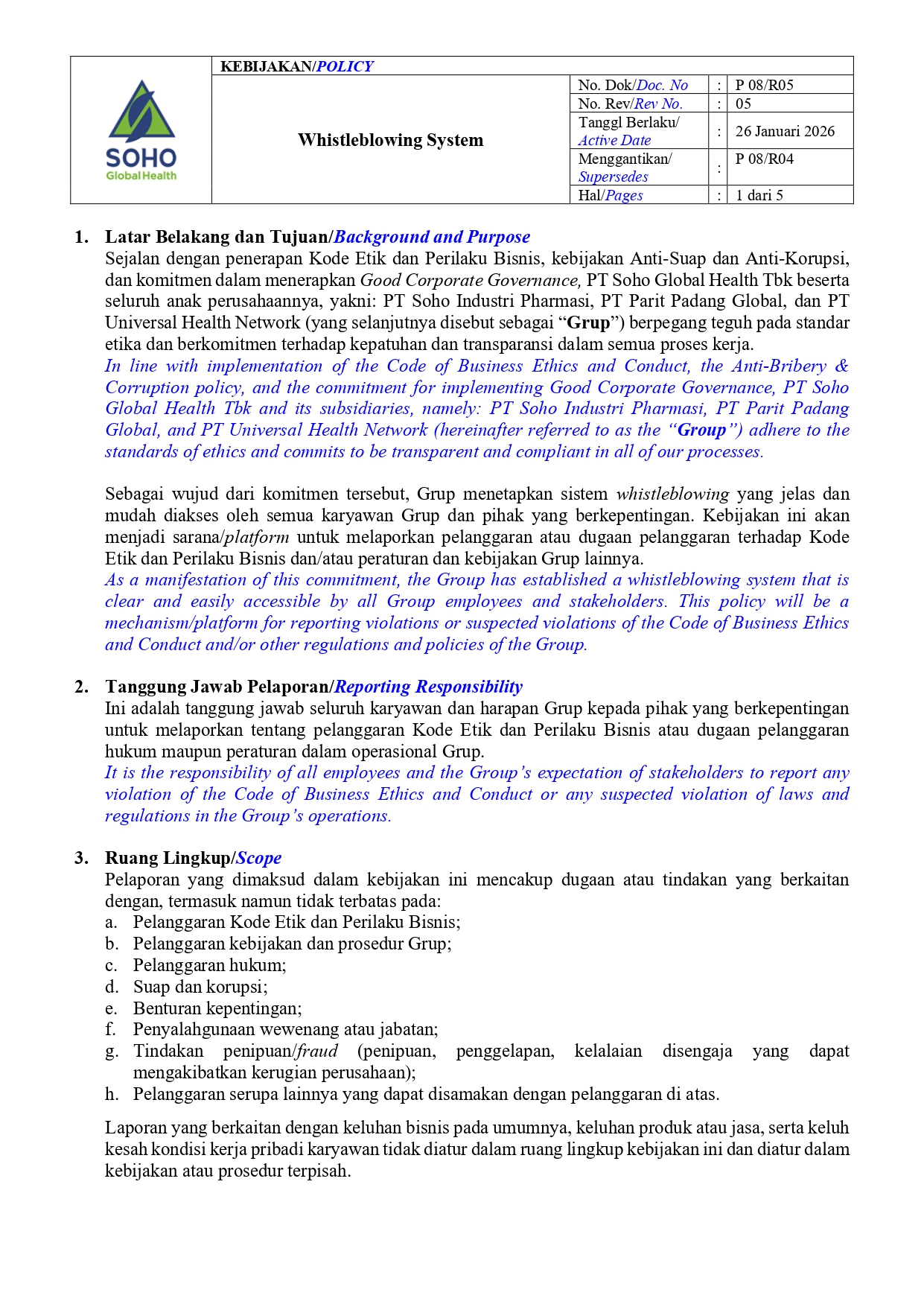
Whistleblowing System
Active Date: 26 January 2026
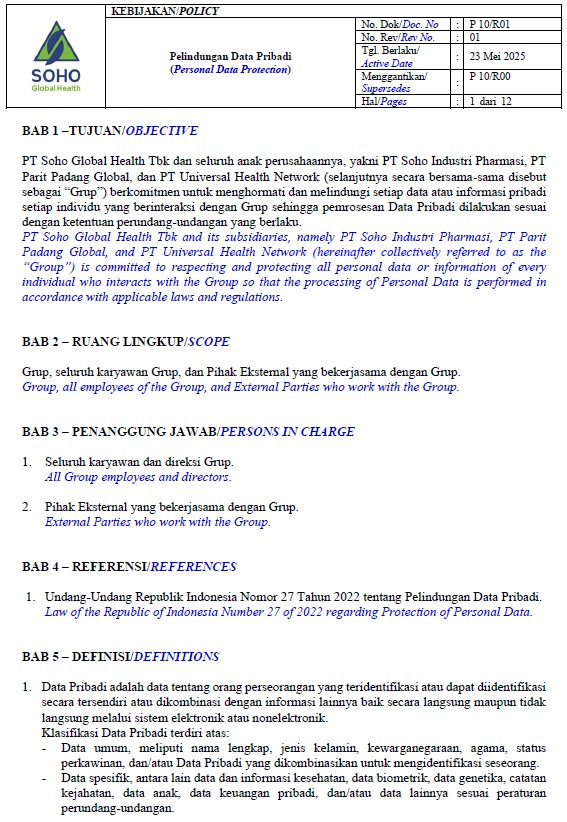
Personal Data Protection Policy
Active Date: 23 May 2025

Implementation of Human Rights
Active Date: 05 May 2025
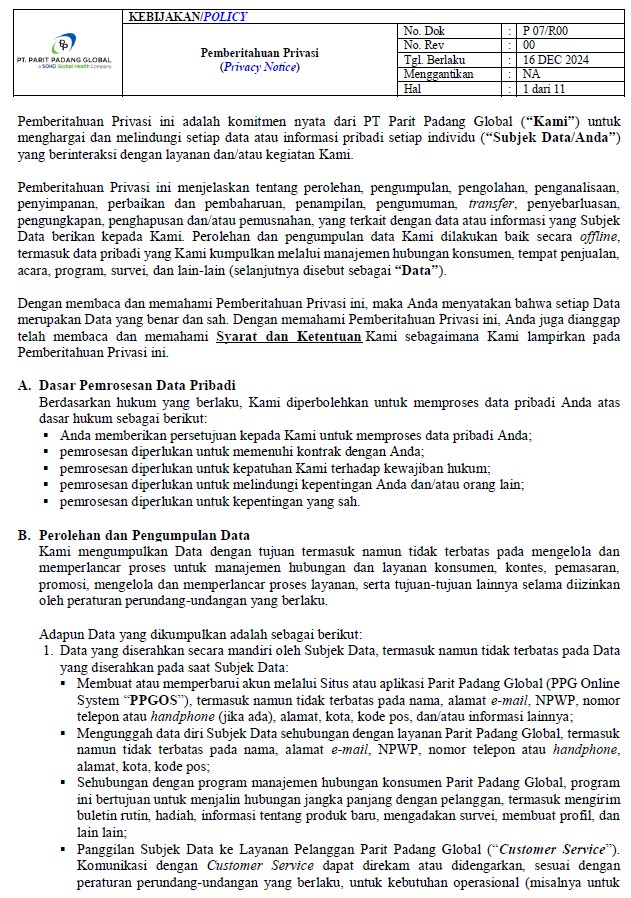
Privacy Notice - PPG
Active Date: 16 December 2024

Prevention and Control of HIV/AIDS in the Workplace
Active Date: 11 November 2024
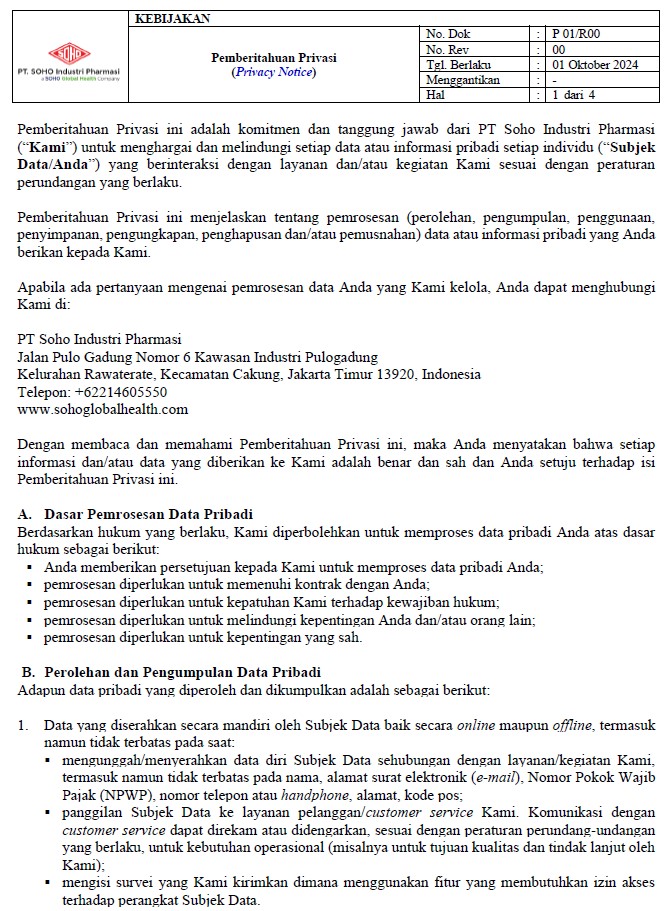
Privacy Notice - Soho Industri Pharmasi
Active Date: 01 October 2024

Health, Safety and Environment (HSE)
Active Date: 19 February 2024
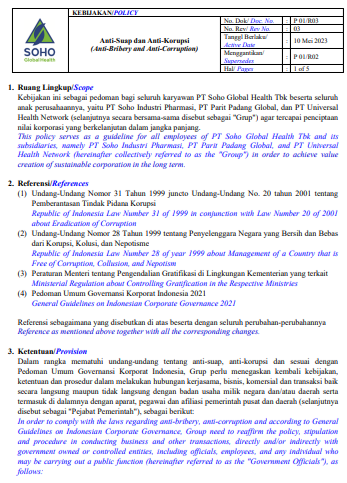
Anti-Bribery and Corruption Policy
Active Date: 10 May 2023
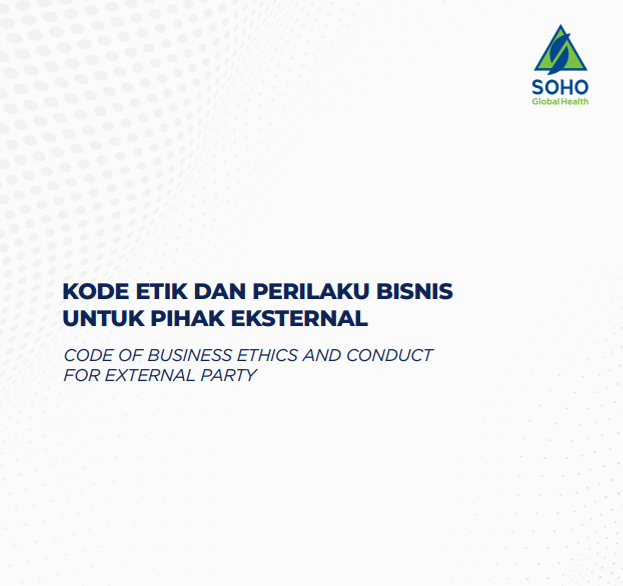
Code of Business Ethics and Conduct for External Party
Active Date: 10 May 2023
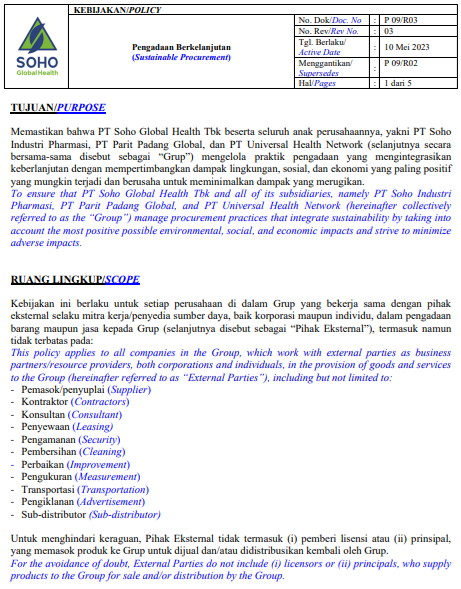
Sustainable Procurement
Active Date: 10 May 2023
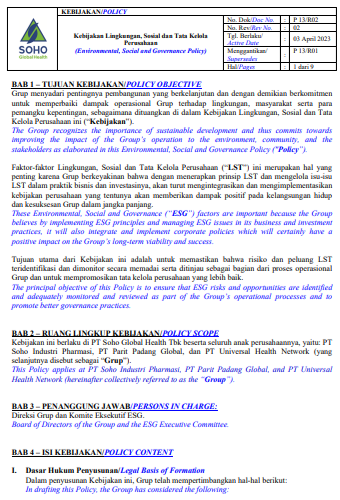
Environmental, Social and Governance Policy
Active Date: 03 April 2023
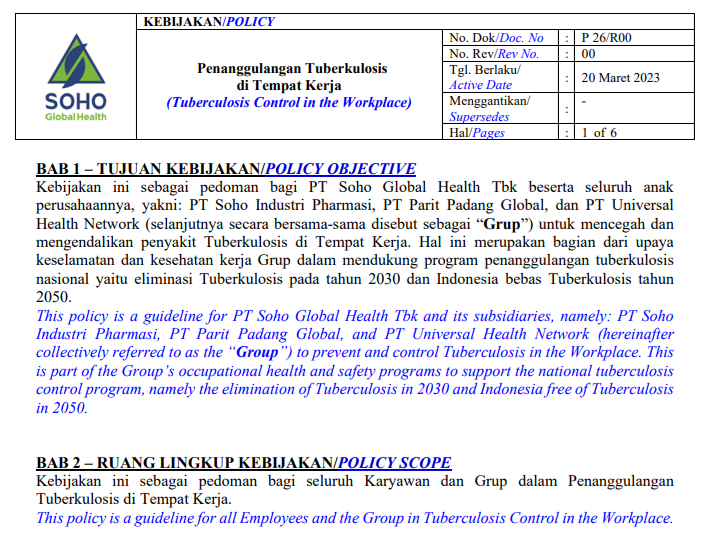
Tuberculosis Control in the Workplace
Active Date: 20 March 2023
[Title]
Content
[Title]
Content
Board of Commissioners
The appointment and election of the Board of Commissioners have complied with the provisions of Company’ Articles of Association and applicable laws and regulations.
The Board of Commissioners is collectively responsible and has a duty to supervise and provide advice to the Board of Directors in managing the Company, including to ensure that Company has implemented Good Corporate Governance (GCG) at all organizational levels or hierarchy. In carrying out its duties, the Board of Commissioners is responsible to the General Meeting Shareholders.
Collectively, the Board of Commissioners possesses the expertise to carry out its mandated responsibilities and consists of member(s) who have adequate understanding, competences to deal with problems arising in business, ability to make decisions independently/drive improvements to Company’s performance and who can effectively conduct reviews and give constructive feedback about management performance. All members of the Board of Commissioners have excellent integrity and reputation.
Composition of the Board of Commissioners
The composition of the Board of Commissioners of the Company are as follows:
President Commissioner : Eng Liang Tan
Independent Commissioner : Harry Salam
Commissioner : Andy Nugroho Purwohardono
In supervising the Company’s management, the Board of Commissioners follows the guideline from Board of Commissioners Charter which contains their duties, responsibilities, and authorities.
The Board of Commissioners can only function with the support of its committees, namely:
- Audit Committee
- Nomination and Remuneration Committee
The appointment and election of the Board of Commissioners have complied with the provisions of Company’ Articles of Association and applicable laws and regulations.
The Board of Commissioners is collectively responsible and has a duty to supervise and provide advice to the Board of Directors in managing the Company, including to ensure that Company has implemented Good Corporate Governance (GCG) at all organizational levels or hierarchy. In carrying out its duties, the Board of Commissioners is responsible to the General Meeting Shareholders.
Collectively, the Board of Commissioners possesses the expertise to carry out its mandated responsibilities and consists of member(s) who have adequate understanding, competences to deal with problems arising in business, ability to make decisions independently/drive improvements to Company’s performance and who can effectively conduct reviews and give constructive feedback about management performance. All members of the Board of Commissioners have excellent integrity and reputation.
Composition of the Board of Commissioners
The composition of the Board of Commissioners of the Company are as follows:
President Commissioner : Eng Liang Tan
Independent Commissioner : Harry Salam
Commissioner : Andy Nugroho Purwohardono
In supervising the Company’s management, the Board of Commissioners follows the guideline from Board of Commissioners Charter which contains their duties, responsibilities, and authorities.
The Board of Commissioners can only function with the support of its committees, namely:
- Audit Committee
- Nomination and Remuneration Committee
Committee
Board of Directors
The Board of Directors’ responsibility in corporate management is aimed at creating added value and ensuring business continuity. The Board of Directors is in charge and responsible collectively for managing the Company. Each Director performs its duties and makes decisions in accordance with the division of duties and authorities. Duties, and other matters related to the Board of Directors must be in accordance with the Articles of Association and prevailing laws and regulations.
The Board of Directors is one of the Company’s main organ that holds full responsibility of corporate management in accordance with the Articles of Association. In conducting its duties, the Board of Directors is responsible to the General Meeting Shareholders (GMS). This responsibility is a manifestation of corporate management accountability in the implementation of GCG principles.
Each member of the Board of Directors may perform their decision-making duty under the segregation of duties and authorities of the Board of Directors. However, the performance of duties of each member of the Board of Directors remains a collective responsibility. The President Director has to coordinate the activities of the Board of Directors.
All members of the Board of Directors are experienced in their fields and understand all of the Company’s business lines properly and correctly.
The composition and number of members of the Board of Directors are determined by the GMS which taking into account the Company's vision and mission to enable effective, precise, fast and accountable decision-making, as well as in order for carrying out the Company's operations with full strategy.
Composition of the Board of Directors
The composition the Board of Directors of the Compant are as follows:
President Director : Ery Yunasri
Director : Piero Brambati
Director : Yuliana
Director : Richard Kidarsa
Director : Lim Chern Han
Director : Pandy Harianto
In managing the Company, the Board of Directors follows the guideline from Board of Directors Charter which was inaugurated on June 9, 2015 which contains the work guidelines and rules, authority, duties, responsibilities, obligations, division of tasks, meetings, provisions on conflicts of interest, share ownership, mechanism arrangements and division of labor between members of the Board of Directors which are not regulated in the Company's articles of association or applicable laws and regulations. With the existence of the Board of Directors Charter, it is hoped that the performance of the Board of Directors will be more focused and in synergy with one another.
The Board of Directors Charter has been formulated based on the prevailing rules and regulations in Indonesia, and is evaluated periodically to ensure its suitability with the development of the Company and the business environment.
The Board of Director can only function with the support of its committees, namely:
-
Internal Unit Audit
-
Corporate Secretary
The Board of Directors’ responsibility in corporate management is aimed at creating added value and ensuring business continuity. The Board of Directors is in charge and responsible collectively for managing the Company. Each Director performs its duties and makes decisions in accordance with the division of duties and authorities. Duties, and other matters related to the Board of Directors must be in accordance with the Articles of Association and prevailing laws and regulations.
The Board of Directors is one of the Company’s main organ that holds full responsibility of corporate management in accordance with the Articles of Association. In conducting its duties, the Board of Directors is responsible to the General Meeting Shareholders (GMS). This responsibility is a manifestation of corporate management accountability in the implementation of GCG principles.
Each member of the Board of Directors may perform their decision-making duty under the segregation of duties and authorities of the Board of Directors. However, the performance of duties of each member of the Board of Directors remains a collective responsibility. The President Director has to coordinate the activities of the Board of Directors.
All members of the Board of Directors are experienced in their fields and understand all of the Company’s business lines properly and correctly.
The composition and number of members of the Board of Directors are determined by the GMS which taking into account the Company's vision and mission to enable effective, precise, fast and accountable decision-making, as well as in order for carrying out the Company's operations with full strategy.
Composition of the Board of Directors
The composition the Board of Directors of the Compant are as follows:
President Director : Ery Yunasri
Director : Piero Brambati
Director : Yuliana
Director : Richard Kidarsa
Director : Lim Chern Han
Director : Pandy Harianto
In managing the Company, the Board of Directors follows the guideline from Board of Directors Charter which was inaugurated on June 9, 2015 which contains the work guidelines and rules, authority, duties, responsibilities, obligations, division of tasks, meetings, provisions on conflicts of interest, share ownership, mechanism arrangements and division of labor between members of the Board of Directors which are not regulated in the Company's articles of association or applicable laws and regulations. With the existence of the Board of Directors Charter, it is hoped that the performance of the Board of Directors will be more focused and in synergy with one another.
The Board of Directors Charter has been formulated based on the prevailing rules and regulations in Indonesia, and is evaluated periodically to ensure its suitability with the development of the Company and the business environment.
The Board of Director can only function with the support of its committees, namely:
-
Internal Unit Audit
-
Corporate Secretary
Committee
Board of Commissioners / Audit Committee
The Company formed the Audit Committee with the aim of assisting the Board of Commissioners in carrying out the oversight function. The Audit Committee is tasked with ensuring that the Company is managed with sound management in accordance with GCG principles and applicable laws and regulations. In addition, the Audit Committee is required to provide advice to the Board of Commissioners regarding the implementation of internal control and company audits, make a written report on each special assignment mandated by the Board of Commissioners, and make reports on the implementation of each audit activity carried out by the Audit Committee in the Company and its subsidiaries, including the level of achievement of the performance of the Audit Committee. The activities and performance of the Audit Committee must be disclosed in the Company's Annual Report.
The Company's Audit Committee is appointed based on the decision of the Board of Commissioners and responsible to the Board of Commissioners in assisting and carrying out the duties and functions of the Board of Commissioners.
All members of the Company’s Audit Committee have fulfilled the criteria for independency, professional experience and integrity, as required by applicable laws and regulations.
The Audit Committee is in charge and responsible for providing professional and independent advice to the Board of Commissioners on reports or other matters submitted by the Board of Directors and Internal Audit Unit and carrying out other tasks related to the duties of the Board of Commissioners. To carry out its responsibilities, the Audit Committee must understand the scope, duties and responsibilities of its work.
The Audit Committee is guided by the Audit Committee Charter which generally contains the following: (i) composition, structure and requirements for membership, (ii) terms of office, (iii) duties and responsibilities, (iv) authority and working mechanism, (v) work methods and procedures, (vi) policy on organizing meetings, (vii) activity reporting system, and (viii) third party complaint handling, which is outlined in the Decree of the Company's Board of Commissioners Number 03/SK-Dekom/SGH/VI/2020 dated June 19, 2020 concerning the Establishment of the Company's Audit Committee Charter.
The Company formed the Audit Committee with the aim of assisting the Board of Commissioners in carrying out the oversight function. The Audit Committee is tasked with ensuring that the Company is managed with sound management in accordance with GCG principles and applicable laws and regulations. In addition, the Audit Committee is required to provide advice to the Board of Commissioners regarding the implementation of internal control and company audits, make a written report on each special assignment mandated by the Board of Commissioners, and make reports on the implementation of each audit activity carried out by the Audit Committee in the Company and its subsidiaries, including the level of achievement of the performance of the Audit Committee. The activities and performance of the Audit Committee must be disclosed in the Company's Annual Report.
The Company's Audit Committee is appointed based on the decision of the Board of Commissioners and responsible to the Board of Commissioners in assisting and carrying out the duties and functions of the Board of Commissioners.
All members of the Company’s Audit Committee have fulfilled the criteria for independency, professional experience and integrity, as required by applicable laws and regulations.
The Audit Committee is in charge and responsible for providing professional and independent advice to the Board of Commissioners on reports or other matters submitted by the Board of Directors and Internal Audit Unit and carrying out other tasks related to the duties of the Board of Commissioners. To carry out its responsibilities, the Audit Committee must understand the scope, duties and responsibilities of its work.
The Audit Committee is guided by the Audit Committee Charter which generally contains the following: (i) composition, structure and requirements for membership, (ii) terms of office, (iii) duties and responsibilities, (iv) authority and working mechanism, (v) work methods and procedures, (vi) policy on organizing meetings, (vii) activity reporting system, and (viii) third party complaint handling, which is outlined in the Decree of the Company's Board of Commissioners Number 03/SK-Dekom/SGH/VI/2020 dated June 19, 2020 concerning the Establishment of the Company's Audit Committee Charter.
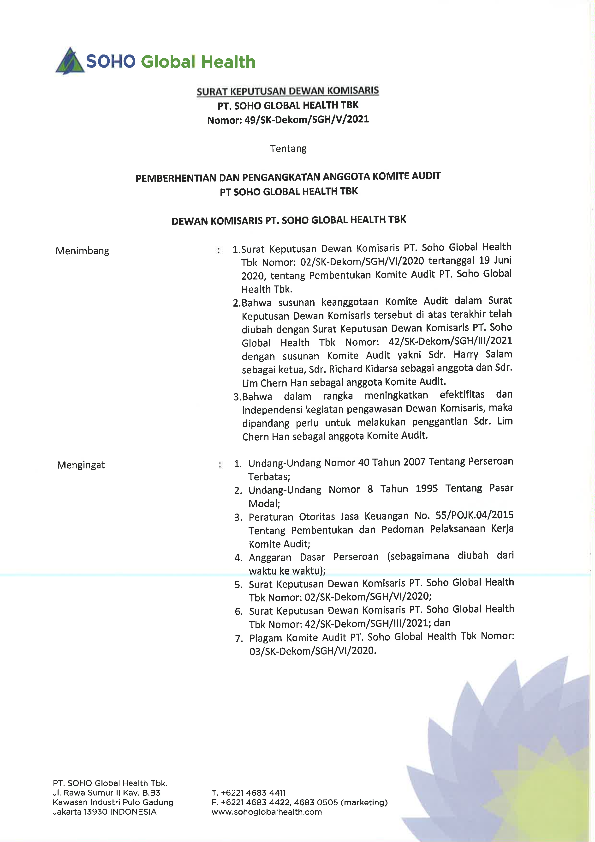
Dismissal and Appointment of the Audit Committee Member

Dismissal and Appointment of the Audit Committee Member
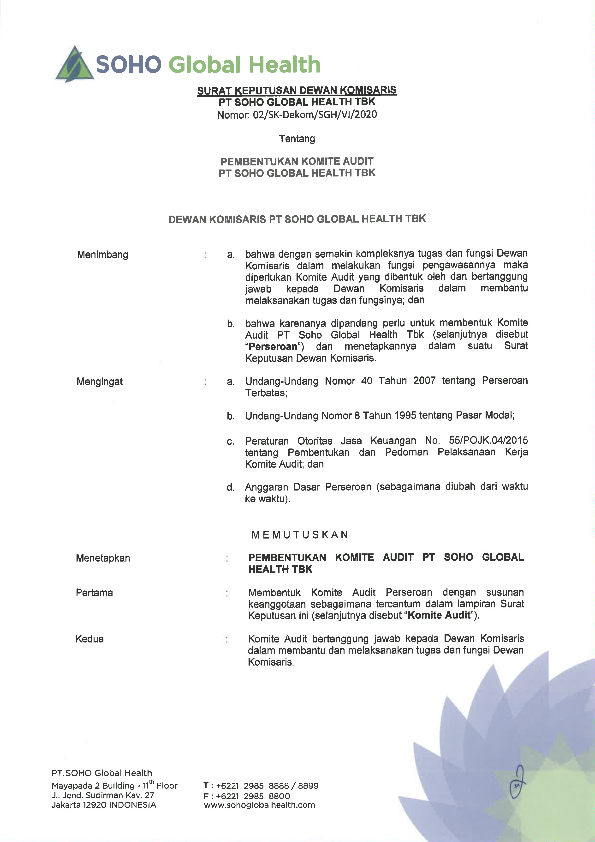
The Establishment of The Audit Committee

The Establishment of The Audit Committee
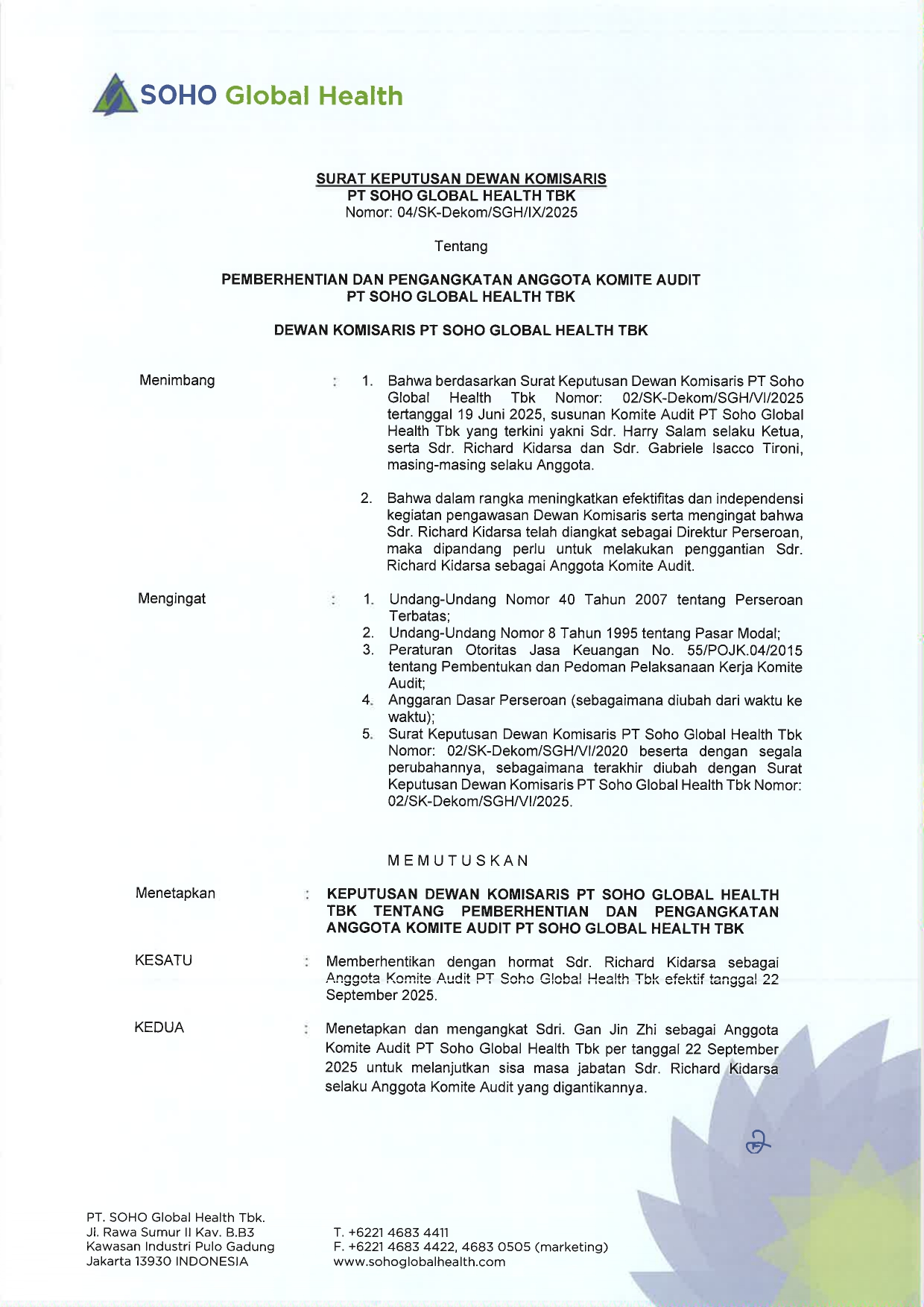
Dismissal and Appointment of the Audit Committee Member

Dismissal and Appointment of the Audit Committee Member
Board of Commissioners / Nomination and Remuneration Committee
The Nomination and Remuneration Committee is a committee that is established to support the implementation of the duties of the Board of Commissioner which is appointed based on the decision of the Board of Commissioners and responsible to the Board of Commissioners and shall acts independently in carrying out its duties and responsibilities.
The establishment of the Nomination and Remuneration Committee refers to OJK Regulation No. 34/POJK.04/2015 concerning the Nomination and Remuneration Committee of Issuers or Public Companies. With the existence of the Nomination and Remuneration Committee, the Company wishes that the process of selecting and making remuneration policies can be carried out in accordance with professional and independent considerations, honest and fair, and without any pressure from any party.
The Nomination and Remuneration Committee is guided by the Nomination and Remuneration Committee Guidelines which generally contain the followings: (i) composition and membership structure, (ii) term of office, (iii) duties and responsibilities, (iv) work methods and procedures, (v) policy on organizing meetings, (vi) activity reporting system, and (vii) procedures for replacing members of the Nomination and Remuneration Committee, as outlined in the Decree of the Company's Board of Commissioners Number 08/SK-Dekom/SGH/VI/2020 dated June 19, 2020 regarding the Establishment of the Company's Nomination and Remuneration Committee Charter.
The Nomination and Remuneration Committee is a committee that is established to support the implementation of the duties of the Board of Commissioner which is appointed based on the decision of the Board of Commissioners and responsible to the Board of Commissioners and shall acts independently in carrying out its duties and responsibilities.
The establishment of the Nomination and Remuneration Committee refers to OJK Regulation No. 34/POJK.04/2015 concerning the Nomination and Remuneration Committee of Issuers or Public Companies. With the existence of the Nomination and Remuneration Committee, the Company wishes that the process of selecting and making remuneration policies can be carried out in accordance with professional and independent considerations, honest and fair, and without any pressure from any party.
The Nomination and Remuneration Committee is guided by the Nomination and Remuneration Committee Guidelines which generally contain the followings: (i) composition and membership structure, (ii) term of office, (iii) duties and responsibilities, (iv) work methods and procedures, (v) policy on organizing meetings, (vi) activity reporting system, and (vii) procedures for replacing members of the Nomination and Remuneration Committee, as outlined in the Decree of the Company's Board of Commissioners Number 08/SK-Dekom/SGH/VI/2020 dated June 19, 2020 regarding the Establishment of the Company's Nomination and Remuneration Committee Charter.
Board of Directors / Internal Audit Unit
The Internal Audit Unit was formed based on the Decree of the Board of Directors Number 05/SK-Dir/SGH/VI/2020 about the Establishment of the Company's Internal Audit Unit dated June 19, 2020.
The Internal Audit Unit is a supporting division to the Board of Directors that is responsible for monitoring and evaluating internal controls, as well as providing independent and objective assurance and consultations to create added value and improve operational performance.
The Internal Audit Unit is responsible to the President Director and acts independently in carrying out its duties and responsibilities. The Internal Audit Unit has unrestricted access to all functions and records within the Company, to fully carry out its mandate.
The Internal Audit Unit is guided by the Internal Audit Unit Charter which contains the vision and mission, scope of work, duties, responsibilities, authorities and Code of Ethics of the Internal Audit Unit, which is outlined in the Decree of the Board of Directors Number 06/SK-Dir/SGH/VI/2020 dated June 19, 2020 about the Charter of Internal Audit Unit.
The Internal Audit Unit reports directly to the President Director, the Board of Directors, Board of Commissioners and Audit Committee. The Internal Audit Unit is an independent unit within the Company.
The Internal Audit Unit was formed based on the Decree of the Board of Directors Number 05/SK-Dir/SGH/VI/2020 about the Establishment of the Company's Internal Audit Unit dated June 19, 2020.
The Internal Audit Unit is a supporting division to the Board of Directors that is responsible for monitoring and evaluating internal controls, as well as providing independent and objective assurance and consultations to create added value and improve operational performance.
The Internal Audit Unit is responsible to the President Director and acts independently in carrying out its duties and responsibilities. The Internal Audit Unit has unrestricted access to all functions and records within the Company, to fully carry out its mandate.
The Internal Audit Unit is guided by the Internal Audit Unit Charter which contains the vision and mission, scope of work, duties, responsibilities, authorities and Code of Ethics of the Internal Audit Unit, which is outlined in the Decree of the Board of Directors Number 06/SK-Dir/SGH/VI/2020 dated June 19, 2020 about the Charter of Internal Audit Unit.
The Internal Audit Unit reports directly to the President Director, the Board of Directors, Board of Commissioners and Audit Committee. The Internal Audit Unit is an independent unit within the Company.
Board of Directors / Corporate Secretary
The Corporate Secretary is appointed based on the Decree of Board of Directors and is responsible to the Board of Directors of the Company.
The Corporate Secretary reports directly to the Board of Directors.
The scope of duties and responsibilities of the Corporate Secretary are as follows:
1. keep abreast of developments in the capital market, particularly the prevailing laws and regulations in the capital market;
2. provide input to the Board of Directors and Board of Commissioners of the Company to comply with the provisions of laws and regulations in the Capital Market sector;
3. assist the Board of Directors and the Board of Commissioners in implementing good corporate governance, which includes:
a. disclosure of information to the public, including the availability of information on the Company's website;
b. submission of reports to the Financial Services Authority on time;
c. organizing and documenting the General Meeting of Shareholders;
d. organizing and documenting the meetings of the Board of Directors and / or the Board of Commissioners; and
e. implementation of a company orientation program for the Board of Directors and / or the Board of Commissioners;
4. as a liaison or contact person between the Company and the shareholders of the Company, the Financial Services Authority, and other stakeholders.
5. providing access to the public for all relevant information regarding the current condition of the Company.
The Corporate Secretary is appointed based on the Decree of Board of Directors and is responsible to the Board of Directors of the Company.
The Corporate Secretary reports directly to the Board of Directors.
The scope of duties and responsibilities of the Corporate Secretary are as follows:
1. keep abreast of developments in the capital market, particularly the prevailing laws and regulations in the capital market;
2. provide input to the Board of Directors and Board of Commissioners of the Company to comply with the provisions of laws and regulations in the Capital Market sector;
3. assist the Board of Directors and the Board of Commissioners in implementing good corporate governance, which includes:
a. disclosure of information to the public, including the availability of information on the Company's website;
b. submission of reports to the Financial Services Authority on time;
c. organizing and documenting the General Meeting of Shareholders;
d. organizing and documenting the meetings of the Board of Directors and / or the Board of Commissioners; and
e. implementation of a company orientation program for the Board of Directors and / or the Board of Commissioners;
4. as a liaison or contact person between the Company and the shareholders of the Company, the Financial Services Authority, and other stakeholders.
5. providing access to the public for all relevant information regarding the current condition of the Company.



